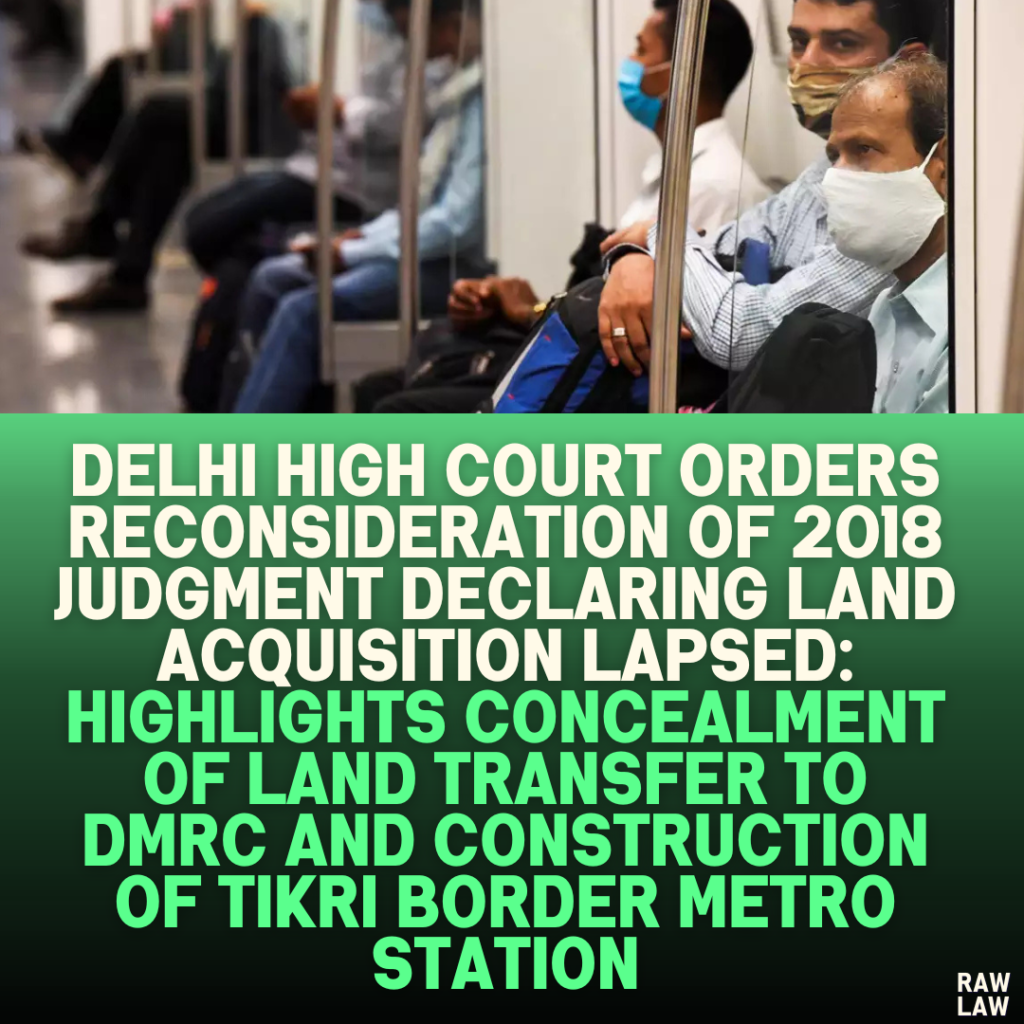Court’s Decision
The Delhi High Court has directed that its 2018 judgment in W.P.(C) 7520/2017, which declared the acquisition proceedings for land in Tikri Kalan as lapsed under Section 24(2) of the Right to Fair Compensation and Transparency in Land Acquisition, Rehabilitation and Resettlement Act, 2013, be reconsidered. The court observed that critical facts, including the transfer of possession to DMRC and subsequent construction of the Tikri Border Metro Station, were concealed during earlier proceedings. Both the petitioner and respondent authorities have been admonished for their lack of disclosure.
Facts
- Land Acquisition: The land in question, measuring 1 bigha and part of Khasra No. 31/33, was acquired in 1987 under the Land Acquisition Act, 1894, for constructing a check barrier at Tikri Border, NH-10.
- Petitioner’s Claim: The petitioner claimed ownership of the land based on unregistered documents, including a General Power of Attorney (GPA), Agreement to Sell, and Will, all dated 1st May 1984. These documents were neither registered nor formally recognized, casting doubt on their validity.
- Land Transfer:
- 2014: The Land Acquisition Collector (LAC) handed over the land to the Public Works Department (PWD).
- 2015: The PWD transferred the land to Delhi Metro Rail Corporation (DMRC), which constructed the Tikri Border Metro Station on the site.
- Initial Judgment in 2018:
- The petitioner secured a ruling that the acquisition proceedings were deemed lapsed under Section 24(2) of the 2013 Act. This judgment relied on the assertion that:
- Physical possession of the land had not been taken.
- Compensation for the land had not been paid.
- The court, however, explicitly noted that the judgment did not confer ownership rights on the petitioner.
- The petitioner secured a ruling that the acquisition proceedings were deemed lapsed under Section 24(2) of the 2013 Act. This judgment relied on the assertion that:
- Concealed Facts: During the 2018 proceedings, neither the LAC nor the petitioner disclosed the land’s transfer to DMRC or its subsequent utilization for public infrastructure.
Issues
- Petitioner’s Ownership: Can unregistered documents confer ownership rights and entitlement to compensation?
- Validity of 2018 Judgment: Should the earlier judgment be reconsidered due to the concealment of critical facts?
- Liability of Respondents: Are DMRC and PWD responsible for misrepresenting or withholding information during prior proceedings?
Petitioner’s Arguments
- The petitioner argued entitlement to compensation or possession of the land, claiming ownership through documents of transfer.
- While conceding that the documents were unregistered, the petitioner maintained that they conferred sufficient rights to claim compensation.
- The petitioner asserted that DMRC’s construction of a metro station on the disputed land without due compensation violated their rights.
Respondent’s Arguments
- LAC:
- Confirmed that the land was transferred to PWD in 2014.
- Admitted that compensation had not been paid to the petitioner.
- PWD:
- Stated that the land was handed over to DMRC in 2015.
- Highlighted that DMRC used the land to construct the Tikri Border Metro Station.
- DMRC:
- Asserted that it lawfully acquired the land from PWD.
- Noted that construction of the metro station began in 2015 and was completed before the petitioner filed the writ petition in 2017.
Analysis of the Law
- Section 24(2) of the 2013 Act: Allows lapse of acquisition proceedings if:
- Physical possession of the land has not been taken, and
- Compensation has not been paid.
- The court questioned whether these conditions were met given that the land had already been transferred and utilized by DMRC by 2015.
- Unregistered Documents: Under Indian law, unregistered instruments like a GPA, Agreement to Sell, or Will do not confer valid title or ownership unless specifically recognized by the court.
- Duty of Disclosure: Both the petitioner and respondents were obligated to disclose material facts to the court, particularly the land’s transfer and subsequent use. The failure to do so undermined the integrity of the 2018 proceedings.
Precedent Analysis
- The court considered Govt. of NCT of Delhi v. Manav Dharma Trust (2017), where the Supreme Court held that subsequent purchasers or those with interest in the land are entitled to remedies under Section 24(2). However, the High Court distinguished this case as the facts were incomplete, and the petitioner’s ownership was dubious.
Court’s Reasoning
- Concealment of Facts:
- Both the petitioner and respondents failed to inform the court in 2018 about the land’s transfer and construction of the metro station.
- The petitioner’s claim of unawareness regarding the metro station on their alleged land was deemed implausible.
- Reconsideration of Judgment:
- The 2018 judgment, based on incomplete information, required reconsideration.
- DMRC and PWD were directed to seek rectification of the judgment by filing applications for impleadment.
- Ownership Claims:
- The petitioner’s documents did not confer valid title, as they were unregistered.
- The question of ownership was left open for determination by an appropriate forum.
Conclusion
The court directed:
- Reconsideration of the 2018 judgment in W.P.(C) 7520/2017.
- DMRC and PWD to file applications for impleadment and rectification of the judgment.
- PWD to provide documents detailing the land transfer from LAC to DMRC.
Implications
- Judicial Integrity: The case highlights the need for full disclosure in court proceedings to ensure fair adjudication.
- Public Infrastructure: Protecting infrastructure projects like metro stations from legal challenges due to procedural lapses.
- Ownership Claims: Reiterates the importance of valid documentation for asserting land ownership.




Pingback: Bombay High Court: SC/ST Act Charges Quashed for Lack of “Public View” Evidence for Some Accused; IPC Offences Retained Against Four Applicants for Physical Assault and Intimidation - Raw Law